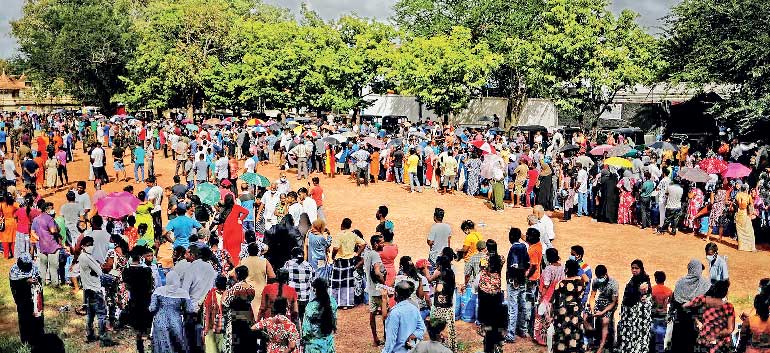Saturday Feb 21, 2026
Saturday Feb 21, 2026
Tuesday, 13 December 2022 00:25 - - {{hitsCtrl.values.hits}}

It would be impossible to overcome the present economic crisis without reviving the apex policymaking institutions enabling them to effectively conduct economic policy coordination, fiscal management, and monetary policy

As a preamble to this year’s Annual Sessions of the Sri Lanka Economic Association themed ‘Managing Economic Crisis in Sri Lanka’, this keynote address elaborates how institutional failures gave rise to the present economic crisis.
The ad hoc policy decisions taken by successive governments undermining economic imperatives are a major factor that caused the crisis. This aspect of poor governance manifested by political dominance has not been adequately addressed in the current discussions on the crisis, and therefore, such analyses are far from reality. This presentation is expected to fill this vacuum taking into account the critical political economy factors.
As contended by the Nobel Laureate Douglass North, technical innovations alone are insufficient to propel economic development. In order for a market economy to flourish, appropriate legal and social institutions must be in place.
Worst economic crisis
As we all know, Sri Lanka is currently facing the worst economic crisis since its Independence. There are multiple economic calamities including negative GDP growth, high fiscal deficit, wide balance of payments deficit, foreign exchange shortage, foreign debt default, hyper-inflation, rapid rupee depreciation, high interest rates, excessive money supply growth, and low savings, and investment.
Given the unsustainable debt burden, Sri Lanka has now become a debt-default country on foreign debt for the first time in its history. The Government’s recent pleading to the World Bank to downgrade Sri Lanka as a low-income country is an indication of the sad plight of the economy. Sri Lanka is considered one of the worst-performing countries in the world today.
Resource imbalances
The current economic crisis is a reflection of the severe resource imbalances in the economy, particularly during the last two and a half decades.
In the basic macroeconomic identity, a country’s domestic savings-investment gap is equal to its foreign savings gap. Domestic savings consist of the savings of the government and the private sector. The amount of foreign savings is equivalent to the current account balance of the balance of payments.
Twin deficits
In the case of Sri Lanka, both domestic and foreign savings are negative. This is due to the fiscal deficit and the current account deficit of the balance of payments. These two deficits are interrelated to one another, and therefore, they are known as the “twin deficits” in economic literature.
The present economic crisis faced by Sri Lanka is largely an outcome of these twin deficits. That is why I mentioned earlier, that the economic crisis is a reflection of the resource imbalances in the economy.
In other words, the economic crisis is due to the failure of successive governments to ensure resource balancing in the economy. There should be an institutional mechanism to ensure such resource balancing in a country such as Sri Lanka which entails continuous fiscal and balance of payments deficits.
Pillars holding economic growth and stability
As regards resource balancing, at least three policymaking areas are crucial, namely, (a) economic policy coordination, (b) fiscal management, and (c) monetary management. They can be considered as the three pillars that are essential to hold a country’s economic growth and stability.
In the case of Sri Lanka, the three pillars collapsed one after the other over the last two and a half decades. Let me now explain how they crashed.
Economic policy coordination pillar collapsed
First, let us consider the pillar of economic policy coordination. Before the mid-1990s, economic policy coordination was somewhat smoothly handled by the National Planning Department which was under the purview of the Finance Ministry. The national planning process conducted during that period was a kind of “indicative” economic planning, but not the socialist type of central planning.
I wouldn’t say that it was a perfect system. But at least, indicative planning facilitated the coordination of the sectoral projects to prevent any harm to the resource balancing of the economy concerning foreign and domestic savings gaps, as I explained earlier.
Such indicative planning was closely monitored by a committee of development secretaries consisting of the Secretaries to selected Ministries engaged in development activities. A five-year rolling plan was formulated annually, and it was published as the “Public Investment Programme”. It provided broad guidance to the private sector on the Government’s policy directions. The intended public sector projects were prioritised subject to stringent project evaluation criteria considering factors such as their internal rate of return, present value, etc., to ensure project viability as well as macroeconomic stability.
President taking over fiscal powers
Deterioration of such mechanism was evident since the mid-1990s when the Executive President started functioning as the Finance Minister. This, of course, contravened the separation of powers between the Executive and the Legislature, which is a cardinal principle of democracy. Even now, the President himself is the Finance Minister.
Going back to the earlier years, with the enormous powers attached to the Presidency, the Finance Minister cum the President had much room to manoeuvre fiscal affairs ignoring the well-established national planning structure which handled economic policy coordination. Assuming the Presidential powers, the Secretary to the Finance Ministry had the opportunity to act as the CEO of the entire economy bypassing financial regulations, fiscal policy rules, tender procedures, etc. This was profusely evident during the reign of a particular Finance Secretary who held this position multiple times.
Indicative planning sidelined
Indicative national planning was marginalised for political reasons, and infrastructure projects were implemented without considering their costs and benefits. In the absence of indicative national planning, there was no concern about the effects of the new projects on macroeconomic balances. Tender procedures were ignored making room for massive corruption at the highest level, and consequent increases in project costs at the expense of the nation.
Invariably, many such projects became unsustainable and exerted a huge burden on the government budget and the balance of payments. This was particularly evident after the end of the ethnic conflict in 2009. Several mega infrastructure projects that were carried out raising foreign commercial loans, particularly from China, have become white elephants by now.
Eventually, the economic coordination pillar collapsed and as a result, there was no mechanism to ensure the resource balancing of the economy.
Fiscal management pillar fallen
The collapse of the indicative planning pillar led to the fall of the fiscal management pillar. As a result of the huge infrastructure expenditure coupled with unmanaged current expenditure, the fiscal deficit continued to expand.
The successive governments have ignored the Fiscal Management and Responsibility Act of 2003, which stipulated specific budget targets to ensure fiscal sustainability. For instance, the fiscal deficit should have been less than 5% of GDP according to the Act. But the fiscal deficit is over 15% of GDP by now. As a result, the public debt has accumulated to unserviceable levels, and the country has defaulted on its foreign debt since last April.
Ripple effect on monetary management pillar
The collapse of the pillars of economic coordination and fiscal management finally has had a ripple effect on the monetary management pillar as well. The fiscal imbalance has severely restricted the policy space available to the Central Bank to conduct its monetary policy operations independently. The Central Bank has been lending to the government by way of money printing without any resistance. This has resulted in an increase in the Central Bank’s monetary base or reserve money causing rapid growth of the money supply.
Such lending to the Government has not only led to expand the money supply but also prevented the adoption of flexible interest rate and exchange rate policies. The interest rate policy is crucial in managing market liquidity while the exchange rate policy plays a central role in ensuring the country’s international competitiveness. The Central Bank has lost its grip on both monetary policy instruments as a result of fiscal dominance.
Open market operations abandoned
Lending to the Government has resulted in a continuous accumulation of Treasury Bills by the Central Bank. This prohibits conducting open market operations, which is the main market-based monetary policy instrument of the Central Bank.
In a situation of excess market liquidity, as evident today, the Central Bank could sell Treasury Bills to mop up excess liquidity. The Central Bank is unable to do so, given its continuous purchasing of Treasury Bills to bridge cash flow shortfalls of the Treasury.
CB’s claim on liquidity shortage self-contradictory
According to the Governor of the Central Bank, however, there is no need at present to conduct open market operations to mop up excess liquidity, since there is a shortage of liquidity in the banking sector. But it should be noted here that there is a fundamental difference between the liquidity level in the banking sector vis-à-vis the liquidity level in the market.
Unquestionably, there is a liquidity shortage in commercial banks, particularly in state-owned banks, due to their excessive exposure to Government securities. In contrast, there is excess liquidity in the market, as a result of the high money growth generated by the increase in the Central Bank’s monetary base due to its substantial lending to the Government. Therefore, it is necessary to mop up such excess liquidity through open market operations, as I explained above.
If there is no excess liquidity in the market, it is questionable why the Central Bank continues to adopt a tight monetary policy by keeping its policy interest rates at high levels. The most recent monetary policy review of the Central Bank states, “The prevailing tight monetary policy is necessary to rein in any underlying demand pressures in the economy.” Thus, the Central Bank’s claim that there is no excess liquidity is self-contradictory.
Monetary policy inactive
Given the fiscal dominance, the Central Bank cannot adopt a flexible interest rate or exchange rate policy or conduct open market operations to achieve its core objective – economic and price stability. Hence, the Central Bank is inactive as far as the monetary policy is concerned.
Policymaking bodies should be free from politics
In a nutshell, successive governments have deactivated the apex policymaking bodies giving rise to the present crisis. Hence, poor governance is the most prominent factor that led to the culmination of the crisis. Such political economy factors are ignored in the current policy discussions on the economic crisis.
The present Government continues the same ill-practices without giving sufficient attention to the urgent need of restoring economic growth and stability. So far, the Government has not produced any economic recovery plan based on a rigorous macroeconomic framework.
In conclusion, I would like to reiterate that it would be impossible to overcome the present economic crisis without reviving the apex policymaking institutions enabling them to effectively conduct economic policy coordination, fiscal management, and monetary policy. Leaving aside the populist agendas of the Government, a strong political will is needed to reinforce the institutional structure.
(The writer, Professor Emeritus in Economics at the Open University of Sri Lanka, is a former Central Banker.)